Trophy makers yearn to make lasting memories
Trophies, medals or shields have sentimental value. They are immortal
like the names of some important personalities. The winners preserve
their trophies or medals as lifetime treasures to keep up their past
achievements alive. They admire them as mementos.
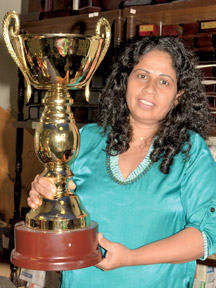 |
 |
| |
Kumari holding a trophy |
The art of manufacturing trophies and medals are very interesting.
Although people use medals and trophies, only few know about the
manufacturing process.
The history reveals that trophies, medals and shields have been in
existence in Sri Lanka for the past 600 years, even before the colonial
rulers arrived in the country.
King Dutugemunu (164 BC - 140 BC) who ruled Anuradhapura had
presented medals and shields to his ten giants (Dasamahayodayo) in
appreciation of the heavy work they completed during a short period. The
medals were manufactured by ancient craftsmen employed in the king's
palace.
Lankan history mentions that the art of making trophies and medals
was introduced to Sri Lanka by the Portuguese, over 600 years ago. Few
families at Pilimatalawa in Kandy first studied the art from the
Portuguese and later it expanded to a few other areas in the country.
Even today craftsmen in Pilimatalawa are famous trophy makers. They make
trophies and medals from brass, but the components of present day
trophies and medals which are used internationally are made of plastic
and metal.
The trophies are generally used to present for winners at sporting
events for their achievements. History says that Romans used first
international trophies to present to the winners at Olympics. The
handsome trophies which are presented to the winning teams of the World
Cup cricket matches are also made of plastic and metal and not from
brass.
It is very important to study the process of manufacturing trophies
and medals. As you know trophies could be made out of brass as well as
plastics and metal. Sri Lankan craftsmen make trophies out of brass,
while, others import the plastic and metal components from countries
such as China, Malaysia and England and fixed them in workshops here.
Each trophy has two to five components. The wooden base is
manufactured by our own craftsmen using thick wood. The trophies are
priced according to the height and the number of components that are
used to manufacture them. They are sold between Rs. 550 and Rs. 20,000.
The Sunday Observer last week visited several places to see how our
craftsmen manufacture trophies, medals and shields. Some craftsmen use
sophisticated equipment to finish trophies, and others in rural villages
are still engaged in manual work. Pilimatalawa in Kandy is famous for
the brass industry. Craftsmen in the village have been engaged in the
industry for over 500 years, even before the colonial rulers arrived in
the country. At present about fifty families at Pilimatalawa are engaged
in the industry. Many of them make brass lamps, replicas of animals etc.
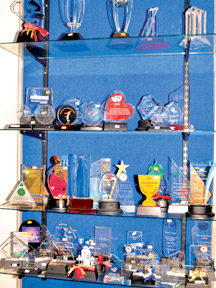 |
|
Displaying trophies |
|
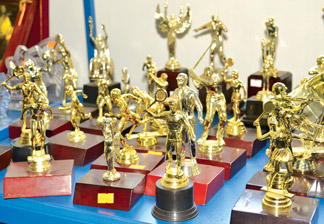
A showroom with medals and trophies |
Gamini Satharasinghe has been a prominent brass products manufacturer
in Pilimatalawa.
His grandfather was also engaged in the same industry in 1930s.
Unlike his father, Gamini, who is 48 years, mainly manufacture brass
medals and trophies as they give better income than from brass lamps.
"The items I manufacture are purchased by schools and many other
private institutions for various functions such as for sportsmeets,
farewell ceremonies, school competitions, year end get-to-gether
ceremonies, corporate prize-givings etc".
The Small Industries Department statistics reveal that over 300
families in the country are engaged in the trophy and medal
manufacturing industry as self employment projects. Most trophy makers
live in the districts of Kalutara, Ambalangoda and Kandy.
Industrialists in urban areas such as Colombo, Moratuwa,
Bambalapitiya, Nugegoda, Nawala and Maharagama are also currently
engaged in the industry.
The Manager of a prominent business enterprise, Furni Fits, Kumari
Attanayake said they started a workshop and a showroom at Nugegoda, 30
years ago to sell trophies, medals and shields.
"We import the plastic and metal components from China, Malaysia and
England and fixed the trophy into a wooden base which is manufactured in
Sri Lanka. The trophies are fixed in the Furni Fits workshop at Nugegoda,".
Kumari says in addition, they also make plaques and nameboards for
individuals, companies, tourist hotels and several other places
according to the orders. Many customers are even coming from the
Maldives and Australia to buy trophies and medals from Sri Lanka as they
are in superior quality and also not expensive when compared to the
prices of other countries.
She says brisk sales for trophies, medal and shields are recorded in
the months of April, August and December every year as these are the
months many sports events, New Year festivals, farewell ceremonies,
Christmas parties and the beginning of new school terms take place.
|
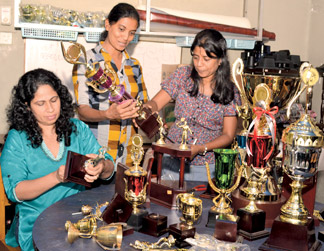
A variety of trophies |
Asked whether the components could be manufactured in Sri Lanka
without importing from foreign countries, she said, as long as the
technology is not in the country, the components of trophies, shields or
medals cannot be manufactured here.
She also requested authorities to set up workshops in our country to
manufacture plastic and metal components, so that we could make various
shapes of trophies and sell them at reasonable prices.
Our trip to Wanduramba in Galle to meet a famous trophy and medal
manufacturer and supplier was unforgettable.
|
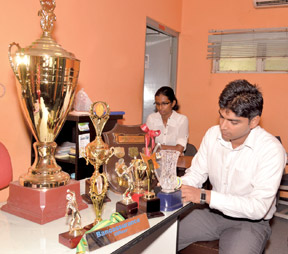
Making trophies at a workshop |
The man, 67- year-old Nimalsiri Punchihewa who lives in a small house
is blind. Once he was a famous trophy manufacturer and also a seller. He
had sold his products in 1970s to foreigners visiting the Galle
Fortress. Nimalsiri had a small showroom to sell his products. He had
gone blind while he was engaged in the trophy making industry.
Although Nimalsiri is blind, he is still engaged in the industry as
an active craftsman with the help of his two sons. Nimalsiri
manufactures brass trophies and they are similar to imported ones. He
has no problem to sell his trophies as long as foreigners visiting Galle.
A longstanding trophy manufacturer and the owner of a trophy showroom
in Bambalapitiya, 64-year-old, Duminda Guruge said, the industry has
been badly affected due to the substandard quality trophies which are
sold by jewellery and gift shop owners at their shops and on pavements.
He wants authorities to stop importing inferior quality components of
trophies as a large number of importers are engaged in the business at
present and earn millions of money. This situation has affected traders
who sell superior quality trophies.
A trophy and medal manufacturer and the owner of a sports goods
showroom at Kollupitiya, Robert Neilanga sells 80 percent of his
products to schools in Colombo and suburban areas at reasonable prices.
He imports high quality durable components only from England and
authorised manufacturers from Malaysia and fix them here. Robert warns
people not to be misled by inferior quality trophies, medals, shields,
challenge cups and plaques as they can hardly last more than five years.
He asked school authorities and the general public to purchase them
only from authorised dealers and not from pavements or unauthorised
shops which have mushroomed in the cities of Colombo, Kandy and Galle.
- AK
|


